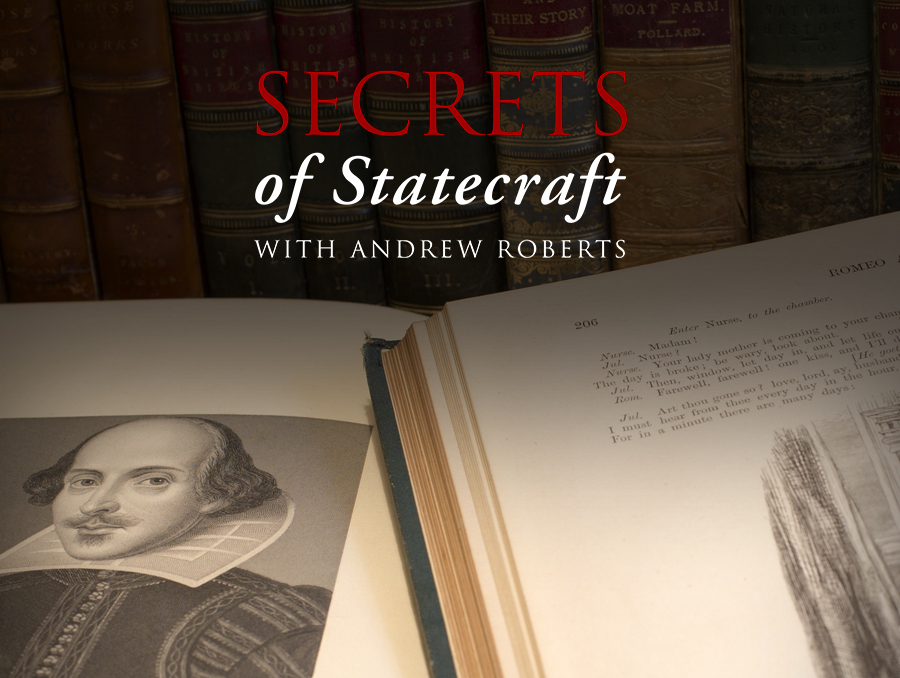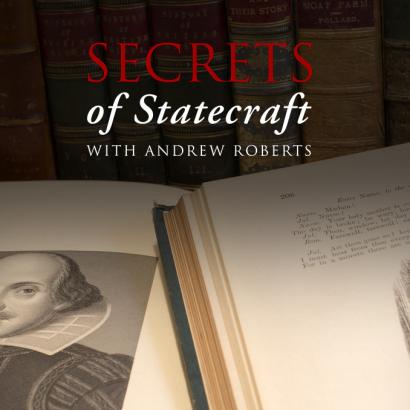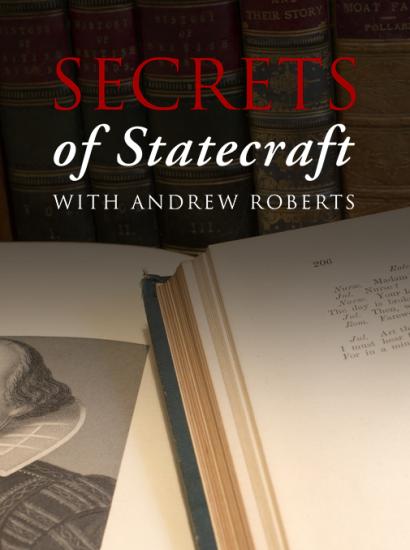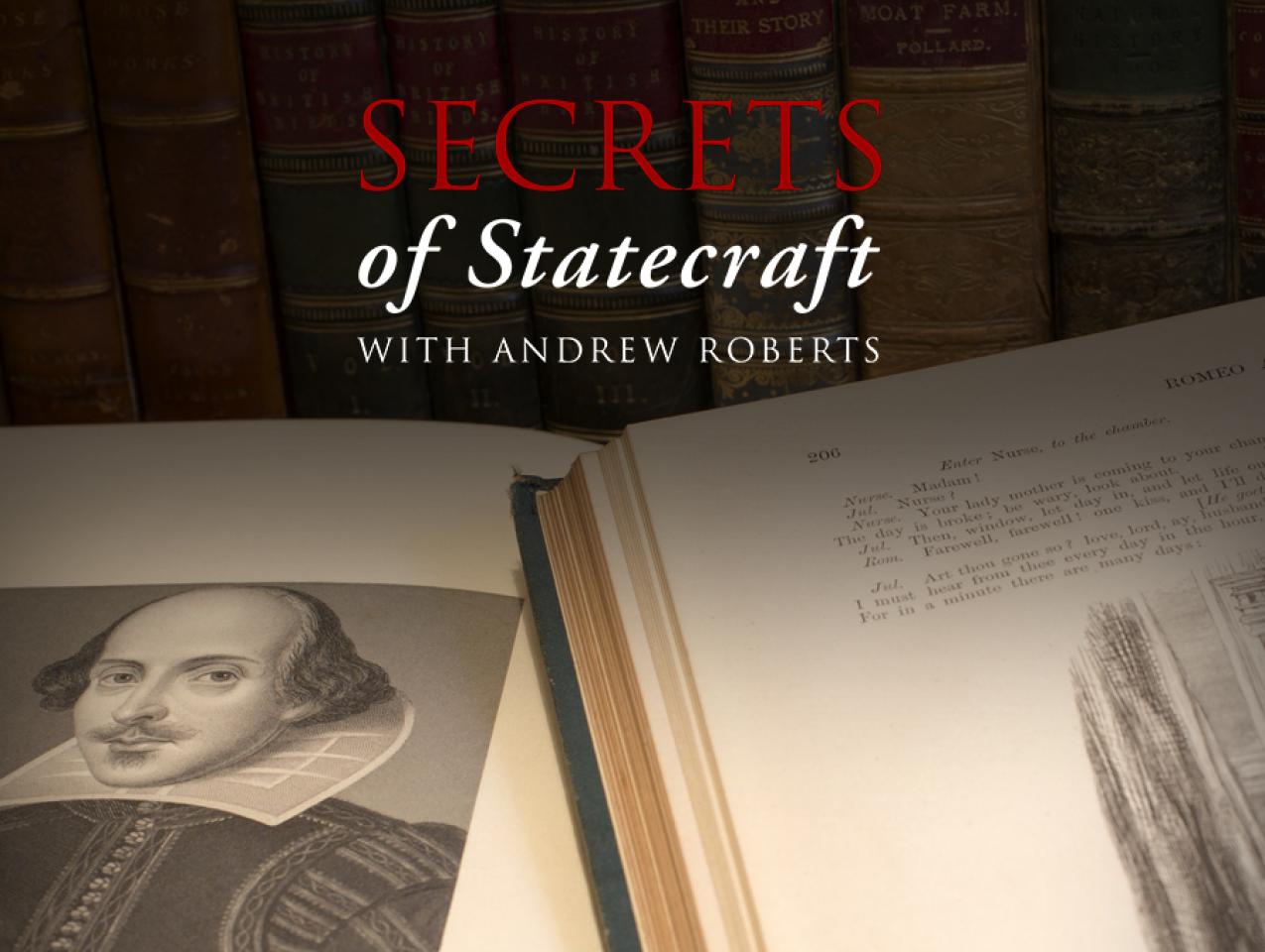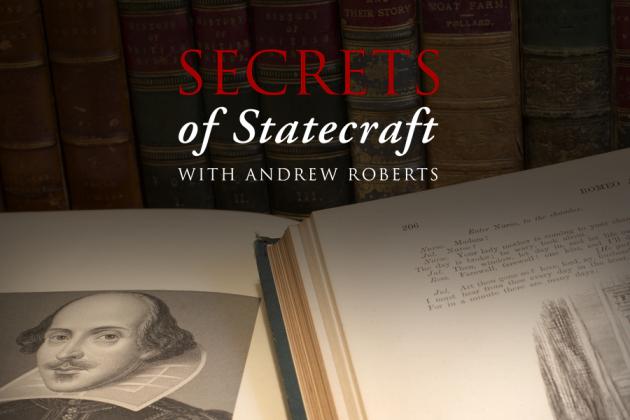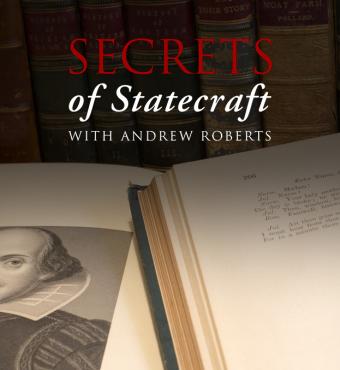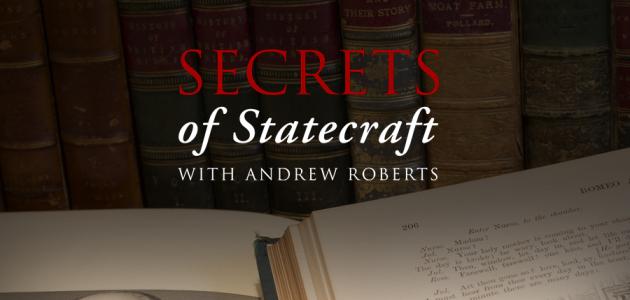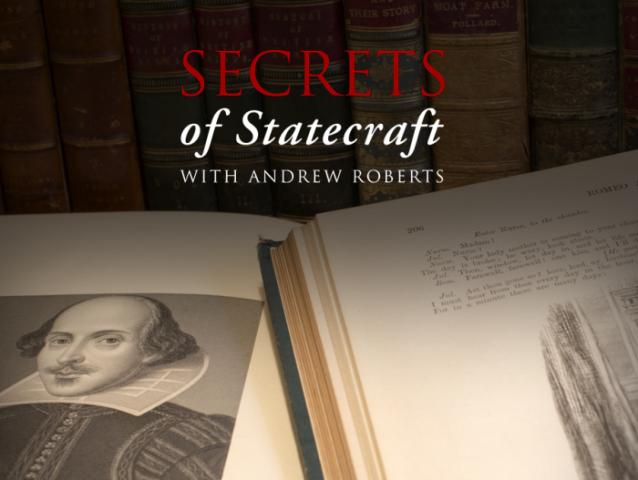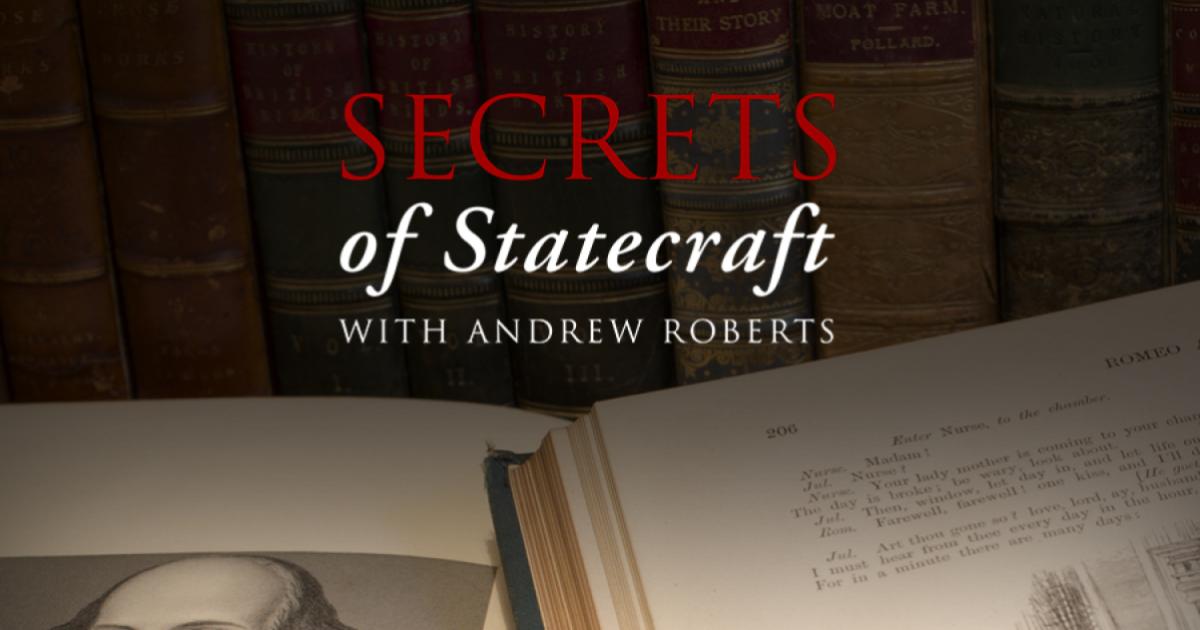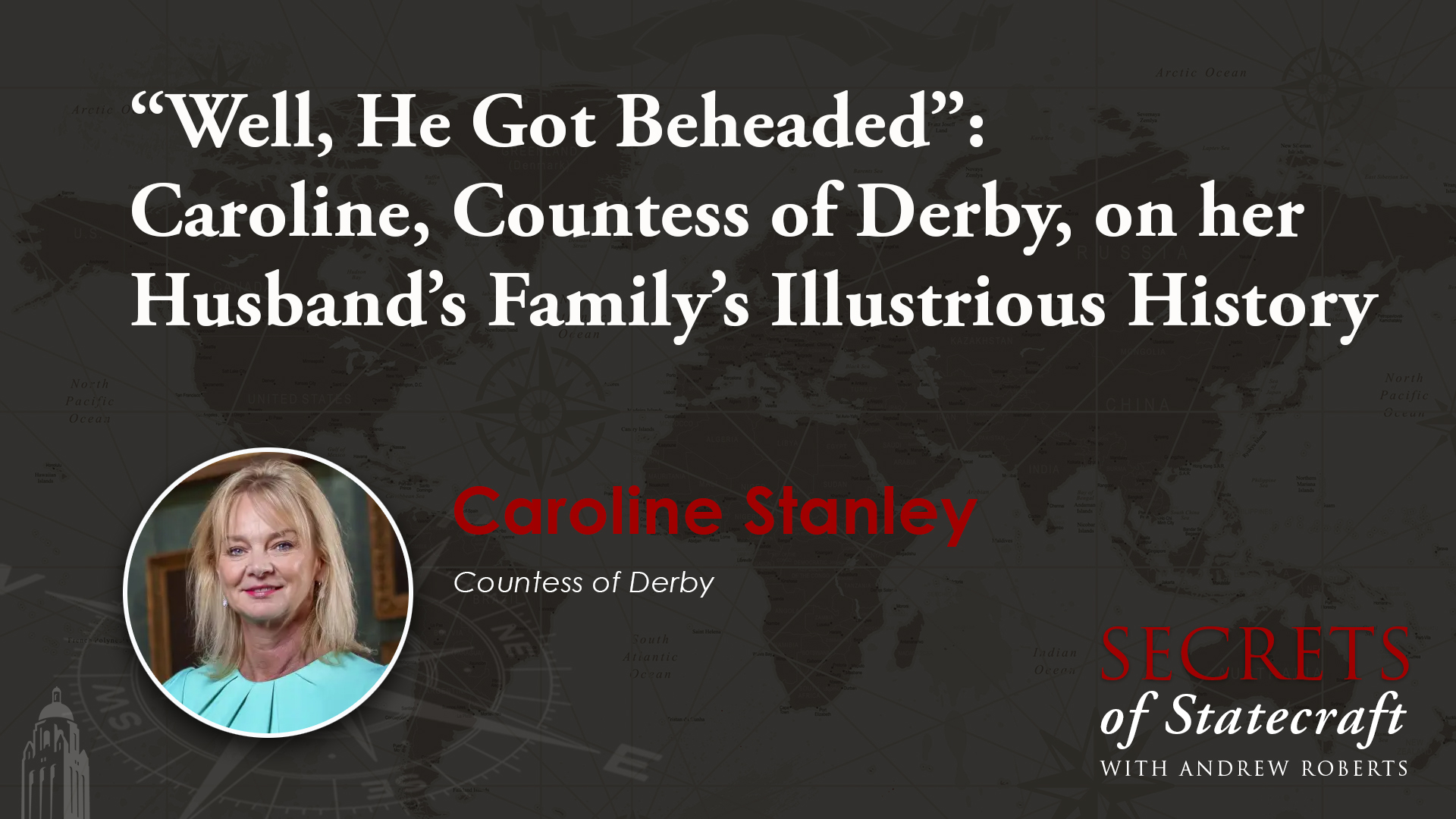Caroline Stanley, Countess of Derby, is an English aristocrat, art historian, and philanthropist. Affectionately known as “Cazzy,” she is married to Edward Stanley, 19th Earl of Derby, and serves as the chatelaine of Knowsley Hall, the ancestral seat of the Stanley family in Merseyside. In this conversation, which also delves into topics ranging from medieval politics to family connections with William Shakespeare, she primarily discusses her edition of the remarkable travel journals of the 14th Earl of Derby, who travelled extensively in North America in 1824-25.
WATCH THE VIDEO
>> Andrew Roberts: Caroline Stanley, the Countess of Derby, is married to the 19th Earl of Derby, whose colorful and very long family history includes the three times prime minister in the Victorian age, whose American travel journal she has recently edited. Ladies and gentlemen, my guest on Secrets of Statecraft for this episode is Caroline Stanley, the Countess of Derby.
She is married to the 19th Earl of Derby and lives at Knowsley hall and has been involved in art history for some time. She was the deputy surveyor of the queen's pictures at Buckingham palace and Windsor Castle and has come across the most extraordinary, ordinary set of diaries of the 14th Earl of Derby, one of the great giants of British political 19th century history.
But before we get on to him, I'd like to just ask a bit more about the background of the 14th Earl's family. So, Cassi, tell us about the first Earl of Derby and how he got that title.
>> Caroline Stanley: So thank you very much, Andrew, for welcoming me on this show.
It's a huge pleasure and an honor and I'll dive right in because there's a lot to cover. Galloping through 600 years of history. So Thomas Stanley you've just asked about, he was the first Earl of Derby and later on I know you asked me a what if question and I'm.
He's part of my what if. So that's a bit tantalizing to start with.
>> Andrew Roberts: Well done. Now that our listeners know, now we'll be sitting on the edge of their seats for the next 40 minutes. But absolutely. Okay, tell us about him.
>> Caroline Stanley: So Thomas Stanley was a stepfather to Henry Tudor and he, he was married to Lady Margaret Beaufort, who was obsessed by education as well as being one of the richest women in the country.
She had great landed estates and both had been married before. He'd actually been married to a Neville before, which was rather amusing because that's maiden name. And she'd been married twice before to Edmund Tudor and Stafford. So her third husband was Thomas Stanley. And I don't know whether they were actually in love or whether it was a strategic marriage to get her son Henry Tudor, who did have a claim to the throne, back over from France.
But she did marry him and she did bring him back. And Thomas Stanley was fighting for Richard iii and because he swapped sides and took his army from one side to the other, Henry Tudor then became King Henry VII and was crowned on the battle of Bosworth. And Edward, Sorry, not Edward.
Richard III died, as we all know, and was buried under the car park.
>> Andrew Roberts: He was indeed. But the Battle of Bosworth Field in 1485 is popularly seen as the moment when medieval history, the Middle Ages ended and modern history with the Tudors began. And of course, the first Earl of Derby being actually created on the battlefield of Bosworth itself was a truly remarkable thing, with Henry VII becoming the first Tudor king.
And the Stanley's, therefore, they're absolutely at the center of this. But if we could just move back, you mentioned that you were a Neville, of course, and the daughter of the 10th Baron Braybrooke, who grew up at Audley End, one of the grandest and most lovely stately homes in England.
Your family was on the other side of the Battle of Bosworth, wasn't it?
>> Caroline Stanley: Yes, because Queen Anne Neville was Richard III's wife and they were cous. It was a love marriage, but she predeceased him actually, when she was only 28. And they say that she died of a broken heart because their darling only son, who was Prince of Wales, died at 10.
And I always feel very sad that they're scattered to the winds where they're buried. So the young Prince of Wales, when he died at 10, he's buried in Middleham Parish Church. She, because she died as a queen, is buried in Westminster Abbey. And Richard iii, as we know, he's buried in Leicester Cathedral for a host of different reasons.
>> Andrew Roberts: Let's jump forward. Six earls, if that's all right. Tell us about the. Tell us about the. Listen, I'd love to go through every single one of them, but we've got. We want to get on to the 14th. Tell us about the 7th Earl and his loyalty to King Charles I and where that led him.
>> Caroline Stanley: Well, he got beheaded, unfortunately, for loyalty to the Crown. And he was married to a very impressive woman called Charlotte de la Tremouille, and she kept Cromwellian troops at bay for a thousand days, apparently. We've got lots of hideous portraits of her. She was an incredibly unattractive woman.
And I always used to say to my children when they were growing up that she scared Cromwell's troops away by just putting her head out of the window. But I think there was probably more to it than that. But he, unfortunately, in 1651, was beheaded for defending the crown.
>> Andrew Roberts: The 12th Earl was the one who started the famous Derby horse race, didn't he? And not just the Derby, there were other ones as well, weren't there?
>> Caroline Stanley: Well, he started the Oaks, which was the first race he did, which was in 1779, and that was for a mile, a mile and a half for three year old fill.
And it was such a success that they decided his friends and him that they would do a further race which was for three year old colts. And it was actually at. I don't know whether you have American listeners, but it was actually at General.
>> Andrew Roberts: I think more of our listeners are American than English, actually, so worldwide.
So this is the point where you have to explain the Derby thing. I think, Cassie,
>> Caroline Stanley: I can do that very happily because I've just been in Kentucky for the Kentucky Derby. But basically in 1779 was the Oaks. 1780, there was a house called the Oaks at Epsom, which General Johnny Burgoyne, who's known as Gentleman Johnny in America, and he was the general who lost the Battle of Saratoga.
But he happened to be married to Lady Charlotte Stanley, who was the sister of the 12th Earl. And they decided they were going to toss a coin. John Burgoyne, Sir Charles Bunbury and his friend Lord Darby, the 12th Earl. And on the toss of the coin, it was going to be what the race was named.
And the race ended up being named the Derby because the 12th Earl won the race. Otherwise, it would have been called Burgoyne or Bunbury, which would have been more complicated. I think you should pronounce.
>> Andrew Roberts: And was he the one who was called the wicked Earl and if so, why?
>> Caroline Stanley: He was called the wicked Earl by his grandson, the 14th Earl, who we're about to talk about. At some stage he was called the wicked Earl because he was a little bit naughty. But it was the time, it was Regency times then, when there was a lot going on, shall we say, behind the bedroom do.
>> Andrew Roberts: And not just the bedroom door, was it? I mean, he was a duelist and he was a reprobate in pretty much every way you can imagine, wasn't he?
>> Caroline Stanley: Well, he was a good old fashioned. Yeah, he was a good old fashioned Regency buck. He, he had, he, he kept fighting cocks, he gambled, he jeweled, he did all of that.
But his first wife ran off with the 3rd Duke of Dorset and he never divorced her and she died in penury on the, on the south coast, south of the 3rd Duke of Dorset, never married her. And he was actually the direct descendant of John Germain, who was the Secretary of State for War in the American Revolutionary War.
So there's, there's loads of American connections here.
>> Andrew Roberts: And there are many of use.
>> Caroline Stanley: Yeah.
>> Andrew Roberts: Let's go to, let's go to the biggest one, which of course are these, are these extraordinary diaries. The book's called A North American Tour Journal, 1824-1825, the making of a Prime Minister.
And they're the journals of Edward Jeffrey Stanley, the 14th Earl. And I think I've counted up 18 states of America that he visited. Am I right? Or it's more or less 18.
>> Caroline Stanley: Yes, well, I haven't counted all the states, but I know he alleged to travel 4,000 miles.
>> Andrew Roberts: Which is truly extraordinary in the 1818 20s, isn't it? Mid-1820s. I mean, to be able to do that just physically is an incredible achievement, isn't it?
>> Caroline Stanley: Yeah, well, it was also very hard work. It was a, you know, traveling then was very grueling because, number one, the stage coaches didn't have suspension.
And there's some charming stories in the book like that in one stagecoach, they oversold tickets and so there were 12 people rather than the 10 seats. And a very annoying Frenchman was plonked on his lap and luckily he was light. But, you know, you can imagine nowadays if you went on Amtrak and you had an annoying anybody on your lap, you wouldn't be best happy.
But he was a real trooper, he put up with it all. And then the roads were terrible. There were these things called corduroy roads and they were the Roads where they had locks, logs across them and then attached at both ends and they had sand and mud on them.
But of course, that made the wood rot. And you often lost a wheel when you were going over that and landed in the soup. So it was a. It was a very tough way of traveling. And he did it in eight months. He did the whole journey
>> Andrew Roberts: in eight months?
Yes. And of course, also it was only. It was less than 10 years after the end of the Anglo American War. So politically, it was a fascinating time. And he came away with a very positive view of America, didn't he?
>> Caroline Stanley: Yes, I think that's probably the most.
On my book tour, I was very much saying, this is my gift, my family's gift to our special relationship. Because he is very positive about everything he saw. I mean, apart from obviously the conditions of the slate and the enslaved people. But that, we'll come on to that.
>> Andrew Roberts: Yes, of course.
>> Caroline Stanley: Yes, but he was very positive about everything he saw in terms of education, in terms of the Native Americans, the people he met. He says that this country, even though it's a young country, has got a very advanced democracy and the British Empire could learn a lot from it.
There are many, many aspects that the British Empire could improve upon.
>> Andrew Roberts: Let's talk about slavery, because he had a enlightened few, didn't he? He thought the whole thing was an absolute monstrosity and an atrocity and it needed to be ended. And then there is a sort of happy ending with regard to the British Empire and slavery because of him, isn't there?
>> Caroline Stanley: Yes, well, he. I mean, it's a difficult one. And I always tread very carefully when I talk about sl. Slavery because, of course, the British Empire had slavery in the colonies. So I'm not saying that, you know, the British Empire was anyway, you know, remarkably innocent about this, but because of what he saw in the south and in the north, he saw the conditions of the enslaved people themselves, and he actually cared.
He can cared about their conditions. He spoke to them. And in the appendix of the book, he actually repeats a conversation he has with somebody. And he asked this enslaved person whether if this chap worked very hard, would he get overtime from his master? And the guy just laughed.
He said, no, mother, you know, because if you're an enslaved person, you didn't get overtime. He also was very unhappy at the way that. That women's bodies were dehumanized, because after the international slavery, international trade in slaves was abolished in 1807. And 1806, both in America and in England, the only way that you could bring, well, produce more enslaved people was to produce them rather than bring the actual, you know, traffic.
Human flesh, bringing them in from Africa or anywhere else. So it's. It's a complicated. You know, he was a man of his time. He knew that slavery existed, and he was a guest of people who owned plantations. But that didn't stop him writing that slavery is a stain on humanity and it infects every single part of humanity.
And he felt that part of the reason that slavery existed was racism. And he condemned the racism that promoted slavery. And he said that because of slavery, there wasn't the opportunity, there wasn't the education. And he writes in very strong terms. And there's this remarkable sentence that he writes in 1824, that one day he says, slavery is a stain on humanity, and one day this country could have a black president.
>> Andrew Roberts: Yes. That's an extraordinary thing to write in 1824, isn't it? It's sort of uplifting that somebody of that kind of liberal, conservative temperament could be quite so enlightened. And it wasn't just. And of course, he actually put these things into practice when he was Colonial secretary himself, these views, didn't he?
Tell us more about that.
>> Caroline Stanley: Yes, well, he was the guiding hand as Colonial Secretary pushing through the Slavery Abolition Act. And he never actually went to the colonies after he came back from America. I mean, his son of course was Foreign Secretary, but he didn't go. I mean not then because his son was too young.
But he never went. But what he did do is he took out this very large loan from the treasury. And in our book, you can see also in the appendix, him scribbling down exactly the commercialized of slavery. He works out how much it costs to buy an able bodied enslaved person, how much it costs to keep them for a year and how long they can work for you.
And that I find extraordinary. So he then, based on that matrix, he works out how much he should borrow from the treasury to buy each and every slave their freedom. And he does it per capita head and gives the money to the planters.
>> Andrew Roberts: And that's the basis of the Slavery Abolition Act of 1833.
It wouldn't have passed otherwise, would it?
>> Caroline Stanley: No,
>> Andrew Roberts: but it does allow us to abolish slavery some 32 years before the United States is able to. And obviously not with any bloodshed compared to the US Civil War, which, which costs 700,000 lives or so.
>> Caroline Stanley: Yes, well, I mean if you want to look at the numbers, the Slavery abolition Act of 1833 emancipated more than 800,000 enslaved people in the British colonies.
So he, with money and the quill of the pen, you know, liberated those people, whereas in America it was a different thing. And maybe Lincoln would have done that. You know, I think he would have, would have followed that regime.
>> Andrew Roberts: Yes, no, absolutely. He was also, of course at the forefront of religious toleration with regard to Jews, wasn't he?
And with the, the emancipation of, of Jews in 1858, where did that, where did that impetus come from?
>> Caroline Stanley: Well, that comes from his first diary. So he, he did two big trips and I've published both diaries. His first diary was going to Naples. He actually rode from Knowsley to N is a rather wonderful alliteration, but would.
Have been incredible
>> Andrew Roberts: on a horse, do point out it wasn't in a rowing boat.
>> Caroline Stanley: Yes, was on a horse. Yes, apart from across the Channel. And because it was just after the Napoleonic War, he couldn't go through France, but he was incredibly clever and spoke French, Italian and German all fluidly.
So he had a very immersive time when he went to Naples. But when he was in Rome and he was only 20 at this time, he witnesses this annual ritual which is when the Jewish people have to process to the Papal state to thank them for their freedom.
And he writes in the first book, which is called A Grand Tour Journal 1820-22, he writes in that first book that this is demeaning. And so you can see various things coming through the early diaries, like his horror of seeing enslaved people in Livorno and Venice coming through later on in America when he travels for the second time.
And because he's horrified by this anti Semitic demeaning of people and made to force and genuflect, he passes the Jewish relief Act in 1899. And the first person to actually benefit from that is Lionel Rothschild, who had actually been voted as a Member of Parliament twice before and never taken up his seat because he didn't want to deny his face by putting his hand on the Bible, as you know, to swear allegiance to the monarch as head of the faith.
>> Andrew Roberts: What was, what was he doing there in the first place? What was the impetus for him and three of his friends from Oxford to go to America in the first place?
>> Caroline Stanley: He went to America. It's a rather charming story. He went to America because he fell in love with a local girl.
When he came back from Italy, he fell in love with a lovely girl called Emma Caroline Bootle Wilbram. And I always feel a certain affinity with her because my Christian names are Caroline, Emma, all these things. So Emma, Emma Caroline built a Wilbroom, was only 18, he went out to the Grosvenor coming out dance and he met her and he fell in love with her.
But unfortunately she came from the wrong side of politics and the family then were liberal Whigs and she came from a very staunch Tory party. So the wicked Earl grandfather sent him off to America with three friends who all were Members of Parliament. So it was sort of a diplomatic foray delegation.
And as a result they had lots of letters of introduction. They had, they had doors opened everywhere because there were four MPs going around 25 years after the American Revolutionary War and 10 years after, well, just after 10 years after the 1812 War in America, which by the way, is never taught on the English syllabus.
>> Andrew Roberts: No, there are so many important things that aren't taught on the English syllabus. Do you know, only 11% of British schools teach Trafalgar and water, and only 18 Agincourt. So I'm afraid in, in 30 years time, no one's going to know when we talk about the Battle of Bosworth, what on earth we're talking about.
It's tragic. Anyhow, moving on from my pet gripe yes.
>> Caroline Stanley: Well, maybe these, maybe these, maybe these podcasts will bring it to life.
>> Andrew Roberts: Fingers crossed. One hopes so. But what this did mean is that these, these four MPs, including, of course, the future Earl of Derby, at a time when the Earldom of Derby were one of the most powerful and wealthy men in the empire, it opened doors, as you said, and they met everyone.
These diaries are absolutely packed. I'm just going to read out a couple of people, including John Adams, Lafayette, Daniel Webster, John C. Calhoun, James Monroe, Andrew Jackson. They met absolutely everybody, didn't they? I mean, it's the most extraordinary thing. The only person that he didn't meet, although his three friends did, was Thomas Jefferson.
Tell us why not.
>> Caroline Stanley: Well, he did stand up the president, which is a little bit embarrassing. And I've just taken Teddy out to Monticello, where I was speaking, to apologize to the fact that his forebear had stood up the president, which I felt very strongly about. But the reason why is when he was in Charleston, he was actually meant to be spending longer in Charleston, and he sent his desk down.
But when he was in Charleston, he got a letter from his grandfather saying, you know, you're obviously still in love with Emma. You should marry her. And the reason why he found out that they were still in touch is Edward Stanley. The young man had promised his grandfather that he wouldn't keep in touch with Emma, Emma, Caroline, and he was forbidden both of them from keeping in touch.
But it's rather charming because love does always find a way. And he wrote letters to her mother, Lady Scumsdale, and Emma wrote letters to the three traveling companions. So the whole way around America they did continue their love affair, which the grandfather then found out about and said, yes, you can come home.
So he, he decided he was just going to leg it home. And he. For 11 days, he rode on a very bumpy, overcrowded stagecoach to get to Washington in order to see the inauguration. And I think the Washington bit of the diaries is almost the most interesting for anyone who's got any sort of political antennae because he does have a ringside seat.
He meets everyone, as you say, and he meets John Adams, the old president, and says that he speaks completely fluent French and is. He's got amazing manners and is in very good health. He meets Quincy Adams. He's not so polite about him. He says that he's. His eyes water and he never looks at you straight in the face.
And he doesn't look like a man who should be trusted. Andrew Jackson he meets. But even though they should have the same sort of politics, he doesn't seem to get on with him. And he meets Henry Clay. I mean, they have this ringside suit. But then as soon as the.
The inauguration is over
>> Andrew Roberts: that's the inauguration. Of John Quincy Adams, isn't it? After the corrupt bargain election of 1824.
>> Caroline Stanley: 1824. So I think it's in February. The inauguration's in February, 1825. And so he decides he's not going to carry on with his trip. You know, there's plans to go to Monticello and actually even Mexico, I think, but he just.
He just gets on a boat and. And goes back to England and. And marries Emma pretty much immediately. And they go and live in Ireland and happily ever after and she becomes the prime minister's wife.
>> Andrew Roberts: Tell us a bit, a bit also about Ireland, because that fits in very much, doesn't it, with this concept of noblesse oblige.
He doesn't just treat Ireland like so many British aristocrats of the day, which is basically a. To take money out of. He actually believes in. In putting A lot of effort and. And thought and philanthropy and good works into doesn't he?
>> Caroline Stanley: Well, his, his impression of Ireland is very much based on his impression when he was going around Canada because he sees in Canada the way that the Irish settlers have a very difficult time there.
And there had been at that time a sort of forced encouraged expatriation with the. With the Irish because of the famines to take them over to Canada and give them land and give them a job. But it was very difficult there because of the winters. But when they were there the Irish Catholics and the Protestant English children played together and were taught together.
And he saw this as a very significant thing. He was always been interested in education. And so having seen that in Quebec when he comes back and gets married to Emma he goes and lives and the family have this estate called Balaquistine which is or did have which is in counter Tipperary.
And he goes and lives there and he spends a lot of time there and realizes that in fact the problem with Ireland at that point was the absentee landlords. And he writes that and he gets. The person who encourages him to get involved in Ireland is in fact they're Marx of Lansdowne who is his political mentor between coming back from Naples and going to America.
And he sees the fact that the Catholics in Ireland when he's living there at Balaquistine they're paying tithes to the Protestant churches. So he abolishes that which is really a fantastic thing to do. And then he puts in free non denominational primary state education in every parish in Ireland in 1831.
And that's actually 40 years before that happens in, in. In England. So what he does in Ireland is, is remarkable. And I think Andrew o' Shaughnessy comes up with this line. I don't know where he get it from, where he read it, but he said the only good thing that the Irish credit the British with is.
Is putting in this primary education. It's the only good thing that the Brits ever did for Ireland.
>> Andrew Roberts: And the fact that he supported religious toleration there as well, didn't he? I mean he voted for the Maynooth Grant and so on.
>> Caroline Stanley: Yes.
>> Andrew Roberts: Tell us about Native Americans.
He was fascinated by their life and culture, wasn't he?
>> Caroline Stanley: Yes, he was. Well, when he went across Lake Erie and Lake George he traveled with Colonel Talbot and Colonel Talbot really knew the Native American people very well. So he managed to get up close and ate with them and met them and went in their tents and he talks about the fact that their canoes are incredibly light and he could lift them with a, you know, one finger.
And he describes how those same canoes are used then as tent poles. He meets corn planter and he meets Elizabeth Kerr Brand and describes Elizabeth Brandt as being incredibly elegant with amazing deportment, similar to a Victorian society hostess. He describes their agriculture and he says that they're incredibly dignified people.
Also, while he's there, he travels with James Fenimore Cooper. And they're so enchanted, both of them, by the beauty of the surrounding countryside, that Edward Stanley persuades James Fenimore Cooper to write a book. And that novel is the Last of the Mohicans, and it's dedicated to Edward Stanley, which is a fun fact.
>> Andrew Roberts: Another literary connection that you make is with one of my favorite Dickens novels, Martin Chuzzlewit. Of course, Dickens went round there 20 years later. But the extraordinary thing is he seems to have gone to exactly the same places along almost precisely the same route as Stanley. Did he know where Stanley had been?
How was it just coincident, this?
>> Caroline Stanley: No, it wasn't coincidence at all. But we only found this out when I had some friends. It was a wide ranging friend, a bunch of friends staying at Knowsley and we were talking about these journals and it included film producer, actresses and English professors and all sorts of people.
And one of them said, look at the map where Darby went. It's exactly where Charles Dickens went. There must be some connection because he must have known. So she, she, this is Professor Jeannie Grant Moore. She started doing some digging and she found out that Dickens and Darby actually knew each other because Darby had been doing a six hour speech in the Houses of Parliament and a scribe at that point could only do two in any given moment.
So the first scribe did two hours, then someone else did the middle bit and then the first scribe came to do the second bit and he didn't like the repetition, he didn't like the way it being transcribed, the middle bit. So he invited the young scribe who did the first and the last section to Derby House and he stood there in his study and did the whole six hour speech.
Including banging? Including banging, yeah, including banging on the desk. But luckily the scribe didn't have to do the first and the last bit, but he just wanted to get him into the zone. And he ran, wrote it down and he sat there, young man, he said, and what's your name?
And he said, charles Dickens. So Charles Dickens was a young scribe trying to make money very early on, he was only 21 then. And they sort of became friends and then they became co patrons of St. George's Hall. And Darby definitely told him when to go, when he, when he went to America.
And similarly, there's another fun fact. The, the novel Martin Chuzzlewit is actually based on, on Edward Stanley going to America because he's fallen in love with an unsuitable girl. And Martin Chuzzlewit is exactly the same thing, sent by the grandfather to America to cool himself off and comes back and marries the girl.
>> Andrew Roberts: And there are plenty of places in Martin Chuzzlewit that he goes to, which of course are tremendously sort of literary and vivid and the descriptions are very powerful. But you also get that in these diaries of Edward Stanley's. The Niagara Falls and Norfolk and Memphis, Cincinnati, Pittsburgh, you name it, Montreal and so on, where did he like most?
Where did he enjoy being of all of those places, would you say?
>> Caroline Stanley: I think he loved Charleston. I don't think he liked Kentucky very much. He was very fascinated politically by Washington because he was in the House of Representatives when he actually heard the result of the election.
He went to Congress. So I think probably because he was a politician already, I think Washington would have been the place. But he loved the beauty of America and he, he, he also loved going down the Mississippi and he got, he really roughed it when he went down the Mississippi.
And he burnt wood and got drunk and burnt fires and danced around. So, you know, it was a proper full gap year experience.
>> Andrew Roberts: And he, and he ate with the servants and the innkeepers. Even though his father was one of the richest men in the world at the time.
He seems to have had no class prejud about him whatever. Which is a tremendous thing, isn't it for Victorian England?
>> Caroline Stanley: Well, and I think he later got criticized for that but definitely the kernel of where that lack of artifice and lack of prejudice comes from is from his travel journals because when he was in Italy he definitely ate with every innkeeper, whatever.
He was traveling with his uncle then. But when he was in America he, there was, there was one in, in Ohio where he had share a basin with 11 people and the same hand towel.
>> Andrew Roberts: I wouldn't want to do that today, let alone.
>> Caroline Stanley: No. And, and he comments on it.
And then there's another in where there's, you know, he's rather surprised when they say they want their own room and not to have to share with people, but they, there is no alternative. So they do end up sharing a dormitory with 12 people, but luckily they have to get up at 2 in the morning because that's when the horses leave.
And that's. The whole book is incredibly vivid. It is eyewitness accounts of even how bridges are made and how the boats go down the river. He talks about there's some sort of wheel system where a horse, a wheel is on the ground and the horse walks through it and that is how it turns.
So it's completely different to Alexis de Tocqueville, which as you know, is six years later written six years later and published. Actually, I think it's published in two tranches, isn't it? 1830 and 36. And De Tocqueville, who everyone admits to reading in America, I don't know whether they actually did, but they're meant to have because it is on the syllabus.
You know, they share a lot of the same values in the fact that they admire democracy. But Alexis de Tocqueville doesn't have any of the conversations with people. It's just a long supposition of what he saw. Whereas these diaries are juicy. He talks, he, he reports really interesting conversations with people.
>> Andrew Roberts: And well, and of course the other thing is that what Tocqueville is trying to do is essentially write a political book. Whereas this obviously has a great deal of politics in it. But it's much, much more than that, isn't it? It's a private journal. It's a travelogue.
It's a insight into the way in which a young man's mind is, is moving. And your, your subtitle, the Making of a pr Interesting one because going back to that point that you were making about the lack of class prejudice, it was of course, Derby, when he became prime minister, who in 1867 passed the second reform act, which was the thing that gave the vote to the large numbers of the lower middle classes in Britain, especially the urban ones.
So do you see a direct relationship between this tour and the Prime Minister that he eventually, eventually became three times.
>> Caroline Stanley: Absolutely. Totally. It, it, it's completely rooted in what he saw in America because when he was in America and he writes about this, that, that he is fascinated that you could rent property and have the vote.
I mean, not as if you're a woman, obviously, because he was too early for that. But actually, we'll come to women in a minute. He, he, he definitely thinks because of what he saw in America that if you rented property, you should have the vote. You were an upstanding member of society and responsible enough to be able to vote.
>> Andrew Roberts: We'll come to women in a minute. You say let's come to women. Now what were you going to say about that?
>> Caroline Stanley: Well, I think, given how liberal he was, if it had been a more advanced time, he would have given women the vote, and as you know, women didn't get the vote until 1918.
And then those was ones with property and not till 1928, the ones without property. But he,
>> Andrew Roberts: Sorry, Cassie, I'm in Derby, I'm in Paris at the moment. They didn't give women the vote until 1948 here.
>> Caroline Stanley: Did they not?
>> Andrew Roberts: Can you imagine?
>> Caroline Stanley: Anyway, but he had an incredibly high regard for women.
He adored his mother who read him the Bible at night and she gave him his. His ethics and his moral compass and his love of the scripture. Unfortunately, she died when he was 18 and. And then he had this very strong relationship with his step grandmother who was.
Became the wife of the wicked earl. And she was an incredibly famous actress called Eliza Farren and it was quite unusual then for a famous actress to marry into the aristocracy, but she did and she became a very, very successful chatelaine. But she, Eliza Farren taught him how to talk, you know, how to debate.
And she was. Because she taught him how to debate. She, she taught him Shakespeare because she read him Shakespeare at night. And on the age, at the age of four, he would be plonked on the state dining room table and his great sort of party line was reciting a speech from Julius Caesar, but he couldn't say all his Rs.
So it's very charming the way he. Recited it
>> Andrew Roberts: at the age of four and then by the age of eight he was able to write poetry in five languages or something. Completely extraordinary, wasn't he?
>> Caroline Stanley: Yes, he wrote poetry in Greek, Latin, German, French and Italian. And interestingly enough, the original poems are in Eaton because they.
I, I think they must have passed down to someone. And one of my more persistent correspondents has published them and given the originals to Eton College. So I've told Nick Coleridge about them and he's. He's now going to read out when the Boys Matriculate the poem On Leaving Eton.
>> Andrew Roberts: There's a beautiful poem in this book that he wrote when he was 10, which several Stanzas of which strike me as very powerful arguments for the whole concept of noblesse oblige.
>> Caroline Stanley: Yes, well, and that was, it's called the True Meaning of Riches. And you know, the first time I read it, it made me cry that somebody as young as that could really understand that, you know, life is about doing good.
And that's. That basically summed up his whole life. And I, I suppose he would have got that from his mother because his father was a tremendous bibliophile, but kind of like a Mad scientist and shut himself away in the study and had all these animals all around. Knowsley had the largest menagerie.
And I wouldn't have said his father was a huge influence in his life because he was basically David, David Attenborough of his generation.
>> Andrew Roberts: Tell us about his Christianity.
>> Caroline Stanley: Well, he had a very, very strong faith. Everything he did was because of his faith. But he would, when you say Christianity, he.
In Ireland, he obviously didn't have that prejudice between the Catholics and the Protestants, but when he was actually at university, because he had this strong faith and he really did prefer the, the Protestant faith to all others, he read around and taught himself about the Hindu faith, the Muslim faith and the Jewish faith while he was at university.
And that would not have been available on the syllabus. He did that because he was studying Classics and Latin and he wanted to read around the subject and understand more about it. And I think because he was so religiously tolerant, it gave him that extra bit.
>> Andrew Roberts: I'm sure that's true so often with Victorians.
It is the driving force, ultimately. His sense of injustice was obviously a very powerful side of his personality and it ties in very much, of course, with lots of what you've mentioned before with regard to slaves and the Jews and the Irish and so on. And what one comes away with very strongly, I think, from this book, is his sense of noblesse oblige.
It's a concept that of course, stems originally from Christianity, from medieval Christianity, in particular chivalry. It is seen in large numbers of political philosophers, including the Burkean conservatism that he did espouse, and obviously in the Reform Acts and various things that he did when he was Prime Minister.
What it is under, essentially, is all about is that the elites owe a tremendous responsibility because of their privilege and that they need to give back to society constantly. And that. That is an essential part of being a member of an elite. Would you, would you agree with that?
>> Caroline Stanley: I would totally agree with that. I would say that that is his driving force. And you mention Edmund Burke and that is where from he traveled with his, those letters, that book. And also, I mean, it's interesting, when he was traveling in Italy, he had Childe Harold by Byron in his pocket.
So the books he read and kept close to him show where his, his, you know, way of life came from. But this, this noblesh oblige definitely came from that. And he was not frivolous in any way, probably because his grandfather was such a, you know, that type of person.
And it always skips a generation, doesn't it, that, that you see these Regency figures and you probably become a bit straight laced and Victorian.
>> Andrew Roberts: The Knowsley hall, you have had some extraordinary finds there. I mean, it seems like a sort of treasure trove of things. Tell us about some of the.
As well as the notebooks for these fabulous diaries. Tell us what else has been found there over the years.
>> Caroline Stanley: Well, there's just so much. I think the first thing I found was I asked to open up the nanny's bedroom and it had been a shrine since John Darby.
She died and John Darby then shut it up. But I went into the bedroom, I asked the joiner if I could open it up and there was a sort of sucking in of the teeth. I went in there because I was looking for another cupboard, a wardrobe for a spare bedroom.
And I moved the wardrobe and there was this thud and a. A very significant old master painting in a brown paper bag fell down from behind the picture. And to this day I. I'm certainly not going to put aspersions on, on. On the nanny or maybe someone else hit it there.
But all I know is that my husband had to pay tax on it because it was. And then when I did some work on the painting, I found out that the 10th Earl of Darby had bought it and had considered it. Well, it was the most expensive painting he bought.
So someone knew something about that painting. I mean, it's slightly fallen out of fashion now. It was Christ and the Women of Samaria. But at the time someone felt it necessary to hide.
>> Andrew Roberts: And somebody had 500 Roman coins land very nearly on their heads.
>> Caroline Stanley: Yes, well, we haven't really managed to go through all the archives yet, but we do do forays in there when, when our energy persists.
And our curator, Stephen Lloyd saw a file with Witherslack on. And Witherslack was a house in Cumbria. So he thought, I don't know anything about that house, lifted down the file and it nearly decapitated him because it was so heavy, because 600 Roman coins are very heavy. So of course we rang up the British Museum who were appalled that none of them had been wrapped in, you know, the appropriate paper, you know, the anti this and the anti that, and they were all shoved in together.
Anyway, now we've got. They're all itemized, they're all cataloged and they're all in their own little special boxes. And it's very exciting. And we think the 14th Earl bought those because when he went to Italy, he. He didn't buy paintings or we don't think he bought paintings because it would have been very difficult to bring them back.
So we think those coins came from him.
>> Andrew Roberts: And you've also got a theory about Shakespeare, haven't you? Do share that Shakespeare and knows it.
>> Caroline Stanley: It's not a theory.
>> Andrew Roberts: They all say that. Everyone who has a theory says that.
>> Caroline Stanley: No, no, no, it's not a theory.
So as you know, the 4th, 5th and 6th Earl of Derby, so Lord Strange's players, everybody knows that William Shakespeare worked for Lord Strange and Lord Strange was Ferdinando V, Earl of Derby. And what we found, the 4th Earl of Derby had this massive court. He had 120 people of staff who lived at Knowsley.
And when you have a huge retinue, what do you have to do? You have to feed them and you have to entertain them. So Knowsley always had a troop of players to entertain them, including a fool. And when the 4th Earl of Derby died, there was this completely illegible book of his probate, and I sent it to the VA to have it transcribed, because I couldn't read it.
It was in too spidery a hand. And when it came back, you could clearly see that William Kemp had three shillings worth of black satin against his name because he wore the household livery at the funeral of the 4th Earl of Derby, which meant William Kemp never went very far from William Shakespeare, which meant William Shakespeare, we can definitely say, was at Knowsley.
>> Andrew Roberts: You're going to be appearing at the Cliveden Literary Festival later in the autumn. You've got your podcast, the countessofdarby.com called Living History. The last questions are, what the history book or biography are you reading at the moment?
>> Caroline Stanley: Well, to keep on message, I'm reading. I just happen to be reading Anne Somerset's brilliant book, but it's not a book, it's a doorstop.
It's so big on Queen Victoria. A personal history, focusing on Queen Victoria's personal impressions with her relationships with her prime ministers. And it's obviously very interesting to. To see how she treated different prime ministers. Obviously, she was in love with Melbourne because he was like a grandfather figure or father figure.
Disraeli flirted with her outrageously. Yeah, I'd sent her flowers every morning. I mean, really wild cuts. Wild cuts, you know,
>> Andrew Roberts: from the garden, primroses and so on. Yes, exactly.
>> Caroline Stanley: And then my
>> Andrew Roberts: Gladstone, she hated, needless. To say, couldn't stand him.
>> Caroline Stanley: I love the way Anne says mutual revulsion.
>> Andrew Roberts: Yes.
>> Caroline Stanley: And then Lord Derby, there's a sort of mild respect, but it's not particularly friendly. But then I found the other day, the 17th Earl of Derby's diaries, because we had a leak and I was hauling things out to save them getting wet in the library.
And there I found the 17th Earl of Darrabury's confidential diaries. And he gave three pages to how disgusted he was the way Queen Victoria treated his grandfather and his uncle and his father.
>> Andrew Roberts: Are you going to be publishing those? They were confidential when he wrote them, but they're not confidential, a century later.
Those in print?
>> Caroline Stanley: Well, I. I sent them to Anne. I sent her a photocopy and she just rang me up and roared with laughter and actually I'm doing a, a little history seminar day on the 14th. Ellen, she's now going to come up and talk about it on the 16th of October about in.
Because she now has this additional source which she, she hadn't unfortunately seen when she did her, when she wrote her book.
>> Andrew Roberts: It's a fantastic book and I'm really pleased you chose it. And Anne obviously is a, is a really first class historian. What about your. What if.
What, what's the historical counterfactual? I think I can guess actually from what you said right at the beginning about the Battle of Bosworth. But tell me what you. What, what, what it is.
>> Caroline Stanley: Well, it's, it's, it's quite gripping really. What would have happened if Thomas Stanley hadn't put his army behind his stepson and kept his army so his army was 4,000 people.
If he'd kept it with Richard III. So if Richard III had Stanley's support, Richard III most likely would have won.
>> Andrew Roberts: I think undoubtedly one would have won the Battle of Bosworth. Absolutely.
>> Caroline Stanley: Yes.
>> Andrew Roberts: Yeah.
>> Caroline Stanley: So therefore we wouldn't have had a Tudor dynasty, we wouldn't have had a.
Reformation,
>> Andrew Roberts: we wouldn't have had Elizabeth I and all the glories of the, of Elizabeth, the greatest of all of our monarchs.
>> Caroline Stanley: Yes. And because the wars of the Roses entered differently, I mean he probably would have been made Earl of Derby or another title because he, he would have helped Richard III win the war.
But you wouldn't. The Plantagenet line would have continued but you wouldn't have had the Tudors and Stuarts. There wouldn't have been the break with Rome and there we go.
>> Andrew Roberts: Undoubtedly the world would be a very, very different place. You're absolutely right. We'd have King Richard IX on the throne today.
Cassidy Neville, Countess of Derby and the creator of this. Well, not the creator because that's the 14th earl, but the co editor and the, and the force behind this beautiful, really scholarly, highly impressive, immensely readable and, and vivid book. Thank you very much indeed for coming on Secrets of Statecraft.
>> Caroline Stanley: Thank you very much, Andrew.
>> Andrew Roberts: Thank you, Caroline. On the next episode of Secrets of Statecraft, the historian Tim Bouverie will be speaking about the diplomacy between the Allies during the Second World War.







